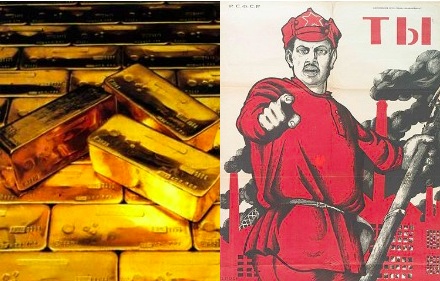Red Gold

During Hurricane Irene, I took some time to read Barry Eichengreen's overview of international monetary history: em>Exorbitant Privilege<. I'm only halfway through but the most interesting anecdote so far has to be Eichengreen's description of why the Soviet Union and Charles de Gaulle supported the world returning to a Gold Standard to gain an advantage over the United States.
In the early 1960's the international monetary system established under Bretton Woods was starting to strain. There were more dollars circulating then there was gold to back up the dollars. As a result, under the Bretton Woods System the dollar was over-valued. (Students of economics call this the Triffin dilemma.)
As the western nations began to grapple with this problem and tried to come up with a solution, it was the French under Charles de Gaulle who advocated for a return to a full gold standard. de Gaulle in turn was advised by French economist Jacques Rueff.
Much like the gold bugs of today, Rueff's advocacy for gold was motivated by an ideological adherence to Austrian economics:
"He [Rueff] had firsthand knowledge of the gold standard's operation although how he could have seen France's unhappy experience then as something to be emulated now is another matter. One explanation is that, as a follower of the Austrian economist Ludwig von Mises, Rueff was an ardent opponent of government inference with the market and viewed the gold standard as a guarantee that governments would not tamper with the monetary system."
As for why de Gaulle was receptive to a gold standard, it seems the prospect of displacing the dollar as the world's reserve currency helped to stoke French nationalism, "It did not hurt that Rueff's arguments resonated with de Gaulle's insistence that France should not take a back seat to any country, monetarily or otherwise."
Amusingly, a country that had a lot to gain from this return to a supposedly "laissez-faire" Austrian system was the Soviet Union. During the Spanish civil war, the Spanish Republicans paid the Soviets for assistance by transferring a very large amount of their gold stock. By the 1960's the Soviet Union had one of the largest gold stockpiles in the world.
Now in order to make his new gold standard function in a larger global economy, Rueff proposed that the price of gold would have be raised. (Incidentally, this doesn't seem like a free market based decision. Doesn't it count as 'central planning' to raise the price of gold to accommodate a larger global economy?).
The Soviet Union saw the benefit in this:
Raising the price of gold would reward countries -- such as, not entirely coincidentally, France -- that had done the most to undermine the system by converting their dollars. Raising the gold price would also create a windfall for the Soviet Union and South Africa. Predictably, Pravda applauses de Gaulle's comments attacking the dollar.
This little historical episode is amusing since the implication is that modern-day Tea Partiers and Gold Bugs would have enthusiastically been on the same page as Pravda at the height of the Cold War.

